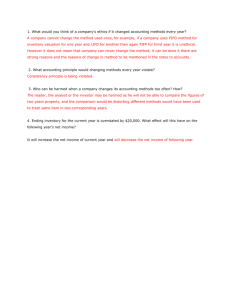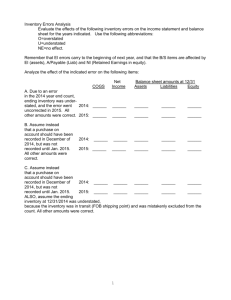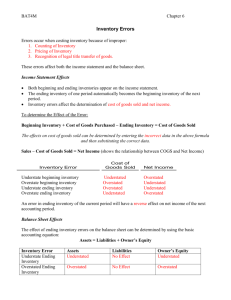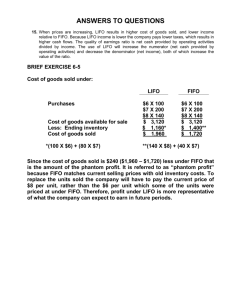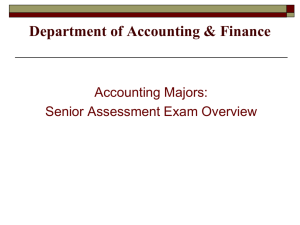File
advertisement
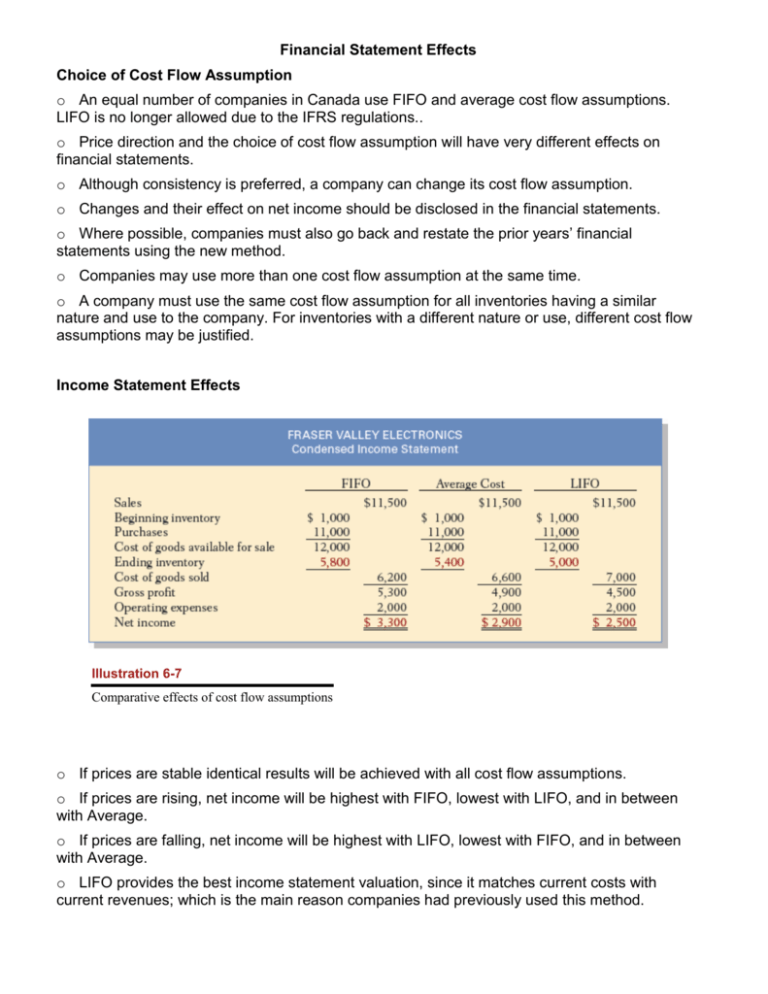
Financial Statement Effects Choice of Cost Flow Assumption o An equal number of companies in Canada use FIFO and average cost flow assumptions. LIFO is no longer allowed due to the IFRS regulations.. o Price direction and the choice of cost flow assumption will have very different effects on financial statements. o Although consistency is preferred, a company can change its cost flow assumption. o Changes and their effect on net income should be disclosed in the financial statements. o Where possible, companies must also go back and restate the prior years’ financial statements using the new method. o Companies may use more than one cost flow assumption at the same time. o A company must use the same cost flow assumption for all inventories having a similar nature and use to the company. For inventories with a different nature or use, different cost flow assumptions may be justified. Income Statement Effects Illustration 6-7 Comparative effects of cost flow assumptions o If prices are stable identical results will be achieved with all cost flow assumptions. o If prices are rising, net income will be highest with FIFO, lowest with LIFO, and in between with Average. o If prices are falling, net income will be highest with LIFO, lowest with FIFO, and in between with Average. o LIFO provides the best income statement valuation, since it matches current costs with current revenues; which is the main reason companies had previously used this method. Balance Sheet Effects o If prices are stable identical results will be achieved with all cost flow assumptions. o If prices are rising, Merchandise Inventory will be lowest with LIFO, highest with FIFO, and in between with Average. o If prices are falling, Merchandise Inventory will be lowest with FIFO, highest with LIFO, and in between with Average. o FIFO provides the best balance sheet valuation, since the costs allocated to the ending inventory approximate their current, or replacement cost. Summary of Effects The cash flow is identical under all three cost flow assumptions. An inventory cost flow assumption only allocates the cost of goods available for sale between the cost of goods sold and ending inventory. It does not impact the cash received from sales, or paid for purchases. Inventory Errors Errors do occur in taking or costing inventory. Some common errors are: (1) mistakes made during counting or pricing, or (2) mistakes made in recognizing the transfer of legal title for goods in transit, Errors affect both the income statement and the balance sheet. Income Statement Effects o If the beginning inventory or the cost of goods purchased is understated, goods available for sale will be understated, causing the COGS to be understated, gross profit to be overstated, and net income to be overstated. o If the beginning inventory or the cost of goods purchased is overstated, goods available for sale will be overstated, causing the COGS to be overstated, gross profit to be understated, and net income to be understated. o If the ending inventory is understated, COGS will be overstated, gross profit will be understated, and net income will be understated. o If the ending inventory is overstated, COGS will be understated, gross profit will be overstated, and net income will be overstated. o Since the ending inventory one year becomes the beginning inventory the next year, an error in the ending inventory will affect net income this year and will affect net income the opposite way the next year. o If the net incomes of the 2 years are added together, the total would be the same as if no error had been made. The overall effects of inventory errors on the current year's income statement are summarized below. U stands for understatement, O for overstatement, and NE for no effect. Balance Sheet Effects o Errors in the beginning inventory have no impact on the balance sheet, as long as the ending inventory is calculated correctly. o If the ending inventory is understated and no other errors were made, owner’s equity will be understated. o If the ending inventory is overstated and no other errors were made, owner’s equity will be overstated.
